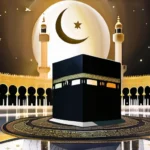Explore the religious, cultural, and historical significance of Friday in Islam, from its origins to modern practices.
Friday holds a special place in the Islamic faith. As the holy day of worship for Muslims worldwide, it is steeped in tradition, symbolism, and spiritual importance. In this article, we delve into the significance of Friday in Islam, uncovering its origins, traditions, and modern practices.
The Historical Significance of Friday in Islam
Imagine a journey back to the very beginnings of Islam, when the first call to prayer echoed through the sandy streets of Mecca. The significance of Friday as a holy day in Islam can be traced directly to The First Friday Prayer, performed by Prophet Muhammad (PBUH) and his companions at the Masjid al-Nabawi.
Why did this particular day stand out from the rest? Was it merely a convenient choice, or was there something more profound about the timing of the first Friday prayer?
In those early days, Fridays were not just another day in the week; they became sacred, much like a bridge connecting the earthly realm with the divine. It’s as if every Friday, the faithful stepped into a moment suspended between time and eternity, preparing their souls for the coming week.
The concept of Friday as a holy day wasn’t just about rest or leisure. It was a reminder that life itself is a journey towards the ultimate destination. Each Friday, believers were called to reflect on their faith, seek forgiveness, and prepare themselves for the eternal realm they aimed to reach.
The historical significance of Friday in Islam goes beyond just a religious observance. It became a symbol of community, unity, and shared purpose. Just as Friday was chosen by Prophet Muhammad (PBUH), it remains a time when Muslims come together not only for prayer but also to support one another, share their burdens, and celebrate the bonds of faith.
From the dusty plains where the first Friday prayer took place, to modern mosques around the world, the significance of this day has endured. It serves as a constant reminder that every moment is an opportunity to connect with the divine, and every Friday offers a chance to renew one’s commitment to Islam.
So, next time you step into your local mosque or even a virtual space for Jum’ah prayer, think about the rich history behind this sacred day. It’s more than just an act of worship; it’s a profound connection with the past and a call towards the eternal present.
Friday Prayer: The Central Act of Worship
Imagine stepping into a vibrant Islamic community on a Friday afternoon, where the sound of adhan, the call to prayer, echoes through the streets. This moment marks more than just the start of a religious service; it’s a pivotal part of the weekly routine for millions around the world. But why is this day so special? Why does it hold such an important place in Islamic tradition?
The significance of Friday prayer lies not only in its spiritual dimension but also in its social and cultural aspects. Just as a cornerstone holds up a building, Friday prayer serves as the foundation for communal worship and unity among Muslims. It is a time when members of the community come together to seek guidance from their faith and to participate in acts of worship and charity.
The timing of Friday prayer is crucial, often held midday on Fridays, which makes it distinct from other daily prayers that can be performed at any time after dhuhr (noon). This synchronization with a specific time and day underscores its importance. By gathering together during this period, Muslims reflect the unity emphasized in Islamic teachings, where every member of the community is equal before God.
The performance of Friday prayer involves both individual devotion and collective worship. As worshippers recite surahs, pray salat al-jum’ah, and listen to a sermon (khutbah), they engage in a form of communal reflection that transcends personal barriers. It’s like a grand symphony, where each individual’s contribution adds to the harmonious whole.
In conclusion, Friday prayer is more than just a ritual; it is a living testimony to the spiritual and social fabric of Islam. As we continue our exploration into the rich tapestry of Islamic traditions, understanding the importance of Friday prayer will provide us with deeper insights into how Muslims seek guidance, unity, and blessings in their lives.
The Symbolism of Friday in Islam
The symbolism of Friday in Islam is profound, woven into the fabric of daily life and spiritual practice for millions of Muslims worldwide. Why does Friday hold such a special place? Is it merely because it comes after Thursday or is there more to it than meets the eye?
One of the most fascinating symbols associated with Friday in Islam is its connection to the number seven, which holds immense significance throughout Islamic cosmology. The universe itself, as described in the Quran, was created in six days (or eons), and the seventh day marked its completion. This divine creation process naturally led people to associate Friday with a sense of fulfillment and perfection.
Another intriguing symbol is the Prophet Jesus (AS). In Islamic tradition, he is revered as a prophet who spoke at an early age and was given knowledge beyond his years. Some scholars suggest that Friday might be linked to Jesus due to a historical event where he gave a significant sermon on this day. Could it be that the day itself carries some of his spiritual weight?
The number seven has multiple layers of significance in Islam, from the seven heavens to the seven angels who record deeds. Fridays are often described as the ‘day of assembly,’ drawing parallels with Jesus‘s gatherings where he taught and healed. This association suggests that Fridays are days when the spiritual atmosphere is charged, providing an ideal opportunity for reflection, worship, and community gathering.
Moreover, the day is seen as a perfect balance between work and prayer, offering a break from the routine to focus on spiritual rejuvenation. Just like a well-crafted mosaic where each piece fits perfectly into the whole, each part of Friday’s observances—prayer, dhuhr, and jumu’ah—fits seamlessly together, creating an intricate tapestry of worship.
In conclusion, the symbols associated with Friday in Islam are rich and multifaceted. They reflect a deep-rooted belief in the divine creation process, spiritual significance, and the importance of community and assembly on this day. As we delve deeper into the symbolism of Friday, it becomes clear that these symbols serve as more than just markers on the calendar—they guide Muslims towards a life of devotion and spiritual growth.
Friday Sermon: A Call to Righteousness
The Friday sermon, known as jumu’ah khutbah, holds a profound significance in Islamic tradition. Is it not fascinating how this simple act of gathering can serve as a beacon for community unity and spiritual guidance? Imagine a large mosque on any given Friday; it’s more than just a place of worship—it’s a living, breathing entity that symbolizes the heartbeat of a Muslim community.
The role of the Friday sermon is multifaceted. It serves as both a call to righteousness and a reminder of the divine obligations we must uphold in our daily lives. The content of these sermons often centers around moral teachings, social justice, and the importance of adhering to Islamic principles. These sermons can be likened to a soulful symphony, where each note resonates with the need for personal accountability and collective responsibility.
But what makes the Friday sermon truly impactful is its ability to connect the past with the present. Preachers draw on historical examples, quoting the actions of the prophets and early companions, to illustrate how Muslims can lead righteous lives today. This is not just a recitation; it’s an invocation, urging believers to reflect on their deeds and strive towards a better tomorrow.
The impact of these sermons extends far beyond the mosque walls. They foster a sense of community, instill moral values, and promote social cohesion. In essence, the Friday sermon acts as a bridge between heaven and earth, bridging the gap between our spiritual aspirations and practical actions in the world.
Through its rich content and powerful message, the Friday sermon serves as a guiding light for Muslims everywhere. It’s more than just a religious obligation; it’s an essential aspect of Islamic practice that shapes the character and behavior of individuals and communities alike. How can we underestimate the transformative power of these sermons in our lives?
The Cultural Significance of Friday in Muslim Communities
The cultural significance of Friday in Muslim communities is profound and multifaceted, weaving through generations like a vibrant thread. How does Friday find its unique place in various societies? In some places, it’s a day filled with communal prayers and social gatherings, while in others, it’s marked by bustling markets and cultural events.
In Saudi Arabia, the grand mosques overflow as worshippers flock for Friday prayers. The air hums with chants and the scent of incense intermingles with the aroma of traditional Arabic coffee, creating an atmosphere that blends spiritual solemnity with social warmth. How can such a diverse gathering not be seen as a symbol of unity in diversity?
Across the Mediterranean, from Morocco to Turkey, Fridays often coincide with bustling souks and vibrant markets. Vendors set up their stalls early, offering an array of goods under the vast blue sky. Here, Friday isn’t just about prayers but also about commerce and community. How does this juxtaposition of spiritual reflection and commercial activity shape one’s day-to-day life?
In Indonesia, known as the world’s most populous Muslim country, Fridays are celebrated with a unique blend of religion and culture. The open-air mosques transform into open forums where not only prayers but also discussions on societal issues take place. How does this practice reflect the community’s commitment to integrating religious teachings with social action?
In every corner of the Muslim world, Friday is a day that transcends individual homes and becomes a communal affair. It serves as a bridge between private devotion and public life, intertwining personal faith with broader societal values. As we look at these diverse practices, can we not marvel at how Friday adapts to each culture while still maintaining its core essence of unity and reflection?
Modern Practices: Adapting to a Changing World
As we delve into the modern practices surrounding Friday in Islam, one wonders how Muslims worldwide navigate their traditions while balancing them with contemporary life. How do they adapt their rituals to fit within busy schedules and fast-paced environments? In a world that often seems at odds with tradition, the question arises: can Friday prayers be made more accessible without compromising their spiritual essence?
Across diverse cultures, Muslims are finding innovative ways to keep Friday prayers central in their lives. For instance, some mosques offer multiple prayer sessions throughout the day, allowing people to join in even if they miss the main congregation. This flexibility ensures that individuals can fulfill their religious duties without feeling burdened by strict schedules.
Moreover, many Muslims are embracing technology to enhance their Friday experience. Virtual prayers and online sermons have become popular, especially during times when physical gatherings might be restricted due to health concerns or travel limitations. These digital platforms provide a means for individuals to connect with their faith community from the comfort of their homes.
The adaptability of Islamic practices is a testament to its resilience in the face of change. As communities worldwide continue to evolve, they are creatively reimagining how to uphold Friday prayers while addressing modern challenges. Whether through flexible timings or digital enhancements, these adjustments highlight the dynamic nature of religious observance in today’s world.
By embracing both tradition and innovation, Muslims ensure that Friday remains a cornerstone of their spiritual lives. In essence, the journey from past to present is not about abandoning old ways but rather about finding new paths that honor our roots while adapting to an ever-changing landscape. As we move forward, one cannot help but ask: what other creative solutions will emerge as Muslims continue to find their place in a rapidly evolving world?
Conclusion
 By understanding the deep-rooted significance of Friday in Islam, we gain a greater appreciation for the rich cultural tapestry that is Islamic tradition. From the importance of congregational prayer to the symbolism of the day, Friday serves as a powerful reminder of faith and community.
By understanding the deep-rooted significance of Friday in Islam, we gain a greater appreciation for the rich cultural tapestry that is Islamic tradition. From the importance of congregational prayer to the symbolism of the day, Friday serves as a powerful reminder of faith and community.











